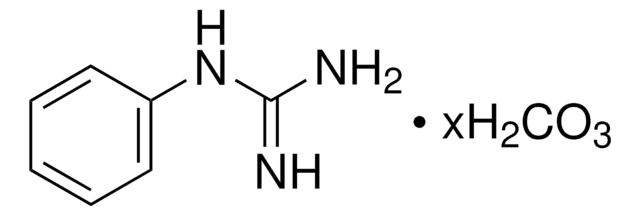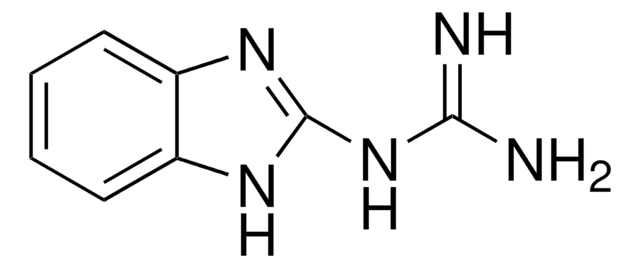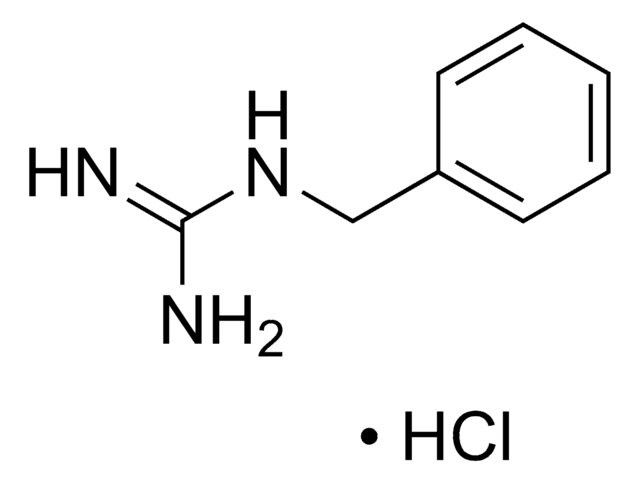All Photos(1)
About This Item
Linear Formula:
CH3NHC(=NH)NH2·HCl
CAS Number:
Molecular Weight:
109.56
MDL number:
UNSPSC Code:
12352100
PubChem Substance ID:
NACRES:
NA.22
Recommended Products
Assay
98%
form
solid
solubility
water: soluble 50 mg/mL, clear
SMILES string
Cl.CNC(N)=N
InChI
1S/C2H7N3.ClH/c1-5-2(3)4;/h1H3,(H4,3,4,5);1H
InChI key
VJQCNCOGZPSOQZ-UHFFFAOYSA-N
Looking for similar products? Visit Product Comparison Guide
Related Categories
Application
Methylguanidine hydrochloride can be used to prepare:
- Biaryl derivatives as BACE1 inhibitors.
- Modified xylose, which is used in the synthesis of biodegradable composite hydrogels.
- Methylguanidinium borohydride ionic liquid, which is applicable as a hydrogen storage material.
Signal Word
Warning
Hazard Statements
Precautionary Statements
Hazard Classifications
Acute Tox. 4 Oral - Eye Irrit. 2 - Skin Irrit. 2
Storage Class Code
11 - Combustible Solids
WGK
WGK 3
Flash Point(F)
Not applicable
Flash Point(C)
Not applicable
Personal Protective Equipment
dust mask type N95 (US), Eyeshields, Gloves
Certificates of Analysis (COA)
Search for Certificates of Analysis (COA) by entering the products Lot/Batch Number. Lot and Batch Numbers can be found on a product’s label following the words ‘Lot’ or ‘Batch’.
Already Own This Product?
Find documentation for the products that you have recently purchased in the Document Library.
Customers Also Viewed
A non-covalent strategy for montmorillonite/xylose self-healing hydrogels
Qi X, et al.
Royal Society of Chemistry Advances, 5(51), 41006-41012 (2015)
Jared N Cumming et al.
Bioorganic & medicinal chemistry letters, 22(7), 2444-2449 (2012-03-07)
From an initial lead 1, a structure-based design approach led to identification of a novel, high-affinity iminohydantoin BACE1 inhibitor that lowers CNS-derived Aβ following oral administration to rats. Herein we report SAR development in the S3 and F' subsites of
Structure based design of iminohydantoin BACE1 inhibitors: identification of an orally available, centrally active BACE1 inhibitor
Cumming JN, et al.
Bioorganic & Medicinal Chemistry Letters, 22(7), 2444-2449 (2012)
Methylguanidinium borohydride: an ionic-liquid-based hydrogen-storage material
Doroodian A, et al.
Angewandte Chemie (International ed. in English), 49(10), 1871-1873 (2010)
Jovana Vušurović et al.
ChemistryOpen, 6(6), 739-750 (2017-12-12)
Interactions of ribonucleic acid (RNA) with guanidine and guanidine derivatives are important features in RNA-protein and RNA-drug binding. Here we have investigated noncovalently bound complexes of an 8-nucleotide RNA and six different ligands, all of which have a guanidinium moiety
Our team of scientists has experience in all areas of research including Life Science, Material Science, Chemical Synthesis, Chromatography, Analytical and many others.
Contact Technical Service









